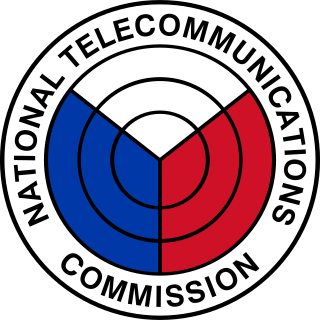Related Research Articles
Telecommunications in Moldova are maintained at a relatively high performance level. Because Moldova is a small country, telecommunications companies managed to achieve good coverage in both wired and wireless communications infrastructure. Landline is available in most settlements, however mobile phone popularity has vastly increased in recent years. Mobile communications infrastructure are fairly well developed but suffer from high prices, nonetheless the amount of mobile subscriptions is growing very fast compared to the landline. As far as the Internet is concerned, Moldova has one of the best wired Internet connections in the world as well as one of the cheapest in $ per Mbit.

The Communications Act of 1934 is a United States federal law signed by President Franklin D. Roosevelt on June 19, 1934 and codified as Chapter 5 of Title 47 of the United States Code, 47 U.S.C. § 151 et seq. The Act replaced the Federal Radio Commission with the Federal Communications Commission (FCC). It also transferred regulation of interstate telephone services from the Interstate Commerce Commission to the FCC.

The Telecommunications Act of 1996 was the first significant overhaul of telecommunications law in more than sixty years, amending the Communications Act of 1934. The Act, signed by President Bill Clinton, represented a major change in American telecommunication law, since it was the first time that the Internet was included in broadcasting and spectrum allotment.
The Liberation Tower is a 372-meter-high telecommunications tower in Kuwait City, Kuwait, the second-tallest structure in the country and the 39th tallest building in the world. The tower is not publicly accessible to tourists. However, the complex building attached to the tower houses government offices such as the Communication and Information Technology Regulatory Authority and a government service center that offer civil services related to Ministry of Interior, Ministry of Foreign Affairs, Public Authority For Civil Information, Ministry of Justice, Public Institution for Social Security, Ministry of Commerce and Industry, Fire Service Directorate, and Ministry of Social Affairs and Labour.

The Federal Network Agency is the German regulatory office for electricity, gas, telecommunications, post and railway markets. It is a federal government agency of the German Federal Ministry of Economics and Technology and headquartered in Bonn, Germany.

The Directorate-General for Informatics is a Directorate-General of the European Commission.

The Philippines' National Telecommunications Commission, abbreviated as NTC, is an attached agency of the Department of Information and Communications Technology responsible for the supervision, adjudication and control over all telecommunications services and television and radio networks throughout the country.

The Canadian Meteorological Centre, located in Dorval, Quebec, is the branch of Environment Canada's Meteorological Service of Canada that is tasked with providing forecast guidance to national and regional prediction centres, and is responsible for running the Global Environmental Multiscale (GEM) model, often referred to as the CMC model, together with its regional and ensemble variants. It is made up of three branches:
Burja or Boorja is a village in Srikakulam district of the Indian state of Andhra Pradesh. Burja is located near River Nagavali.
The Ministry of Communication and Information Technology was an Indian government ministry. It was bifurcated into Ministry of Communications and Ministry of Electronics and Information Technology in July 2016. It contained three departments viz. Department of Telecommunications, Department of Electronics and Information Technology and Department of Posts.
The Internet in Botswana is used by about 28.4% of the population. This is slightly lower than the figure of 28.6% for Africa as a whole in 2015.

The National Communications Commission is an independent statutory agency of Executive Yuan of the Republic of China (Taiwan) responsible for regulating the development of the telecommunication and broadcasting industries, promoting competition and consumer protection, and regulating licensing, radio frequency and spectrum, programming content, communications standards and specifications in Taiwan. The current Chairperson is Chan Ting-I.
Telecommunications in Bosnia and Herzegovina include radio, television, fixed and mobile telephones, and the Internet.
The Georgia Public Service Commission (PSC) is a statutory organ of the state government of Georgia; elected among five commission districts, the board consists of a Chairman, a Vice-chairman, and three Commissioners. PSC regulates telecommunications, transportation, electric and natural gas services in the U.S. state of Georgia. Commissioners are elected in partisan elections statewide, though they must reside in a district.
Botswana Telecommunications Authority (BTA) is a dissolved independent commission that was responsible for regulating all matters related to telecommunications, postal services of Botswana and has been succeeded by Botswana Communication Regulatory Authority. The Minister appoints all five board members, who serve on a part-time basis. The BTA is mandated to promote the development and provision of efficient telecommunications and broadcasting services in Botswana, under the terms of the Telecommunications Act 15 of 1996. There have been legal disputes between the BTA and licensed operators, springing from issues related to interconnection and pricing.

The Information and Communication Technologies Authority (ICTA), is a national telecommunications regulatory and inspection authority of Turkey. It was formerly known as the Telecommunications Authority.

The Michigan Public Service Commission (MPSC) is a regulatory agency which regulates public utilities in the state of Michigan, including electric power, telecommunications, and natural gas services. The MPSC's headquarters are located in Lansing, Michigan.

Telecommunications Regulatory Authority (TRA) is the federal telecommunications regulatory agency of the United Arab Emirates.
Communications law refers to the regulation of electronic communications by wire or radio. It encompasses regulations governing broadcasting, telephone and telecommunications service, cable television, satellite communications, wireless telecommunications, and the Internet.
Authority for Info-communications Technology Industry (AITI) is an independent commission founded under the Telecommunications Order, 2001 in 2001. AITI is responsible for regulating all matters related to telecommunications of Brunei.